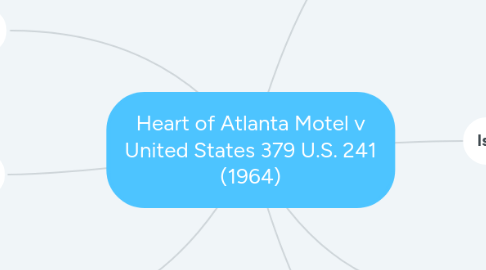Heart of Atlanta Motel v United States 379 U.S. 241 (1964)
von David Hua

1. Rule of Law
1.1. It is within Congress's jurisdiction to regulate a commercial establishment's denial of service based on race under its interstate commerce regulatory powers.
2. Analysis/Application
2.1. Congress maintained that the decision to enforce their jurisdiction of forbidding racial discrimination was based on commercial reasoning, rather than a moral/social matter.
2.2. The Heart of Atlanta Motel was categorized as a commercial lodging facility, and therefore it was within Congress's power to enforce forbidding racial discrimination.
3. Conclusion
3.1. The United States Supreme Court ruled that Congress was within its jurisdiction when passing the Civil Rights act of 1964. Heart of Atlanta therefore was required to cease racial discrimination to its customers and accept individuals regardless of their ethnicity.
4. Facts
4.1. Civil Rights Case which challenged that African Americans and Caucasians were "separate but equal"
4.2. Heart of Atlanta Motel which had over 200 rooms, racially discriminated against African Americans and only allowed white Caucasian guests to stay.
4.3. Violated the Civil Rights Act of 1964 which banned public places to racially discriminate.
4.4. The owner of the motel federally filed that the Civil Rights Act of 1964 violated the 5th amendment which allowed him to be selective of his customer base. He stated that Congress did not have jurisdiction over his business and he was subject to involuntary servitude by allowing African Americans to stay.
5. Issue
5.1. Can Congress forbid racial discrimination in a commercial establishment that accommodates the public?
5.2. Did Congress violate the 5th & 14th Amendments by forcing a property owner to abide by their rules?
6. Impact/Importance
6.1. This court case and the Supreme Court's unanimous 9-0 ruling in favor of Congress was a key contributor for equal rights for African Americans.
7. Influence
7.1. African Americans were often denied stay at hotels and motels, but this decision determined that this was unlawful, and aided African Americans in their pursuit of equal civil rights.


